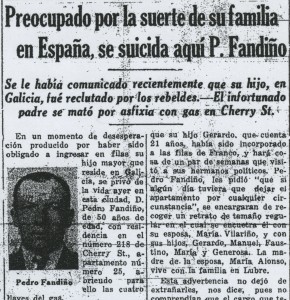Nueva York (4): Pedro Fandiño
 Honest archival work is, I think, the most powerful antidote against complacent and arrogant certainty about the past. I believe that most of us somehow instinctively feel that the present is immensely complex and hard to grasp, and yet we often allow ourselves to think about the past as being somehow less complicated. While we understand that in the present everything is hopelessly jumbled together –politics, economic interests, cultural trends, greed, solidarity, individual and collective stories, etc.– when we look at the past we often don’t hesitate to tease things apart, as if they had existed and developed in isolation from each other. We even compartmentalize (and, in the university, departmentalize) the messiness: “low culture” and “high culture”; politics and economics; religion and psychology, etc., each with its own jargon, each with its own experts.
Honest archival work is, I think, the most powerful antidote against complacent and arrogant certainty about the past. I believe that most of us somehow instinctively feel that the present is immensely complex and hard to grasp, and yet we often allow ourselves to think about the past as being somehow less complicated. While we understand that in the present everything is hopelessly jumbled together –politics, economic interests, cultural trends, greed, solidarity, individual and collective stories, etc.– when we look at the past we often don’t hesitate to tease things apart, as if they had existed and developed in isolation from each other. We even compartmentalize (and, in the university, departmentalize) the messiness: “low culture” and “high culture”; politics and economics; religion and psychology, etc., each with its own jargon, each with its own experts.
Reading old newspapers is particularly instructive in this regard, since, as Benedict Anderson and many others have pointed out, the newspaper lays out, in spatial juxtaposition and temporal simultaneity, the very messy present which constitutes any given moment in the past. In an attempt to understand better the involvement of US-based Spaniards and latinos in the Spanish Civil War, I’ve been sneaking away now and then to the microfilm reading room of the New York Public Library, to spool my way through two New York Spanish language papers, La Voz and La Prensa. Every once in a while, amidst the blaring headlines about the multiple planetary crises afflicting the world in the mid-1930s, there are poignant and heart-wrenching local stories that catch my eye, like this one, on the front page of La Prensa, April 22, 1937.
I translate:
“A tragic echo of the drama in Spain” is the the header of a photograph with the following caption: “Ambulance doctors try in vain to save the life of the Spanish citizen, Pedro Fandiño, yesterday at 218 Cherry Street.”
The accompanying article reads:
“Worried about the fate of his family in Spain, P. Fandiño commits suicide here. He recently learned that his son, in Galicia, had been recruited by the Rebels. The unfortunate father killed himself by asphyxiation with gas on Cherry St.
In a moment of desperation caused by learning that his oldest son, who lives in Galicia, had been obliged to join the rebel forces in Spain, D. Pedro Fandiño, 50 years old, took his own life yesterday here in the city. He lived at 218 Cherry Street, apartment 25. He had left open the four gas valves in the apartment.”












